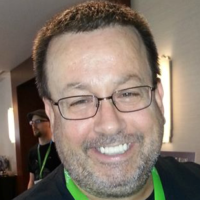Are you a Dabbler?
This is a blog about how much hard work it actually takes to be successful in anything, especially in games.

When someone tells me they’re “pretty good” at Ping Pong, I respond by asking this question: “Have you ever played 8 hours a day for 4 months in a row?” When they answer “no” to that question, I say, “Well then, you’re only fair.”
That may sound harsh, or make me sound like a jerk, but I’ll stand by it. If you’ve never played ping-pong 8 hours a day for 4 months in a row, then odds are, I’m better than you.
Now, it makes no difference if you’ve dabbled in Ping-Pong, but it makes a huge difference if you’re dabbling in your career. And if you’re dabbling in a career in Games, then you’re really in trouble. And that’s because many, many people in Games are not dabbling, they are living it, every day of their lives once they got bit by the Games bug.
So, my newest answer to the “How do I break into Game development?” question is: Stop Dabbling. It’s no longer just “build a game”, it’s “build many games”. Build up your portfolio. Create gameS with a capital S.
One of my best friends in high school was a pretty good Trumpet player, and he was very good but because his father was a Musician, he was just a pretty good Dabbler. He was annoyed that he wasn’t first chair in band and he spent a whole summer practicing for 8 hours a day (or more) in the woods behind his house. And that’s how he earned first chair. And whatever motivated him to do that, transformed him from a Dabbler, to someone to be reckoned with.
In music, I’m a dabbler. I took piano lessons from 6th grade to 10th grade and I learned as much in those 4 years as most people learn in 1 year. The main reason I was such a slow learner, is that I only practiced the day before my lesson (and just about 30 minutes if I was lucky). Now I still enjoy the Piano, and I’ve been playing for almost 50 years now, and back in my college days, I even wrote songs here and there…but I’m still a dabbler. I sound ok, I can even play Moonlight Sonata, but it takes effort, because I’m just a dabbler.
Don’t get me wrong, there is something to be said for “natural talent”, but a lot of people have some “natural talent” in a lot of directions, but it’s the people that choose a direction and put in the hard work that take their natural talent to the next level.
My “natural talent” was for pure math and logic. I’ve been doing puzzles since I was 3 years old and several times in my life I did something difficult, by myself, which helped boost me to the next level. Although not doing “programming”, I was becoming more algorithmically strong by the kinds of puzzles/tasks I set for myself. At 5 years old I learned long division from my father. At about the same time I sat for a whole afternoon on my Grandmother’s living room floor with a deck of cards proving that you can’t get a 19 hand in Cribbage. In 3’rd grade I learned how to use a slide-rule from a book. In 6th grade I learned some algebra from a puzzle book 2 years before I knew what algebra was. In 1981, I solved the Rubik’s Cube by myself in about 10 hours, and then proceeded to carry it around with me for the next year or so, getting down to about 40 seconds on average (using my own method).
In 1981, I got my first programming job (with only one programming course under my belt while getting a B.S. in Mathematics) and I was a semi-dabbler as a business programmer for the next 3 years (and a couple more depending on how you count things).
In 1988-ish, I stopped being a dabbler in programming when I decided to learn C on my own. I spent the next 3-4 years learning C while writing my first computer game by coding 20+ hours a week (in addition to my 40 hour programming day-job (with an hour commute each way)), mostly nights and weekends. That game made less than $200 for me, but it led to 4 job offers (at different times)…and…it got my foot in the door as a Tools/Game-Dev for a small pre-internet company called Interactive Network that sold a device that let you play along with TV (in real time) while watching sports or gameshows like Wheel of Fortune or Jeopardy.
Jump forward, from 2000-2003, I created 9 games on my own while semi-early-retired and/or doing some consulting. Those 9 games directly led to being hired by iWin to create a downloadable version of Mah Jong Quest (with a complete redesign). (7 of those games made me less than $500 total, and the other 2 made about $3000 each). That’s when I sunk my teeth into designing and coding a “bigger game” while learning C++ for real, and while learning a huge framework/cast-system and dealing with an asset pipeline and doing it all while working remotely (which has it’s own set of issues). Although that was just a 40-ish hour per week salaried position, there were times I put in 60+ hours because of something in the framework that I thought needed improving (but didn’t directly affect the game I was working on) that I just “wanted-to-do” because it was interesting and it had a chance at improving performance. (No dabbling there.)
Jump forward to the end of 2009, and after 3 Mah Jong Quest games under my belt (and a couple of other failed projects (where I wasn’t the designer)), I decided I was ready to go on my own and create games that had a chance at making more than $200 or $3000.
But I was no longer a dabbler. Around 1988-ish, I stopped being a dabbler as a programmer. I started reading a lot of books about programming even while learning C myself. (And shortly thereafter learning C++). I stopped dabbling in games about the same time, but didn’t get in the industry until 1993…and then as just a really good “tools guy”. In 2000, I stopped being a dabbler in design, by creating many, many games from scratch and breaking through many other walls in programming. C++, Windows, DX7, Graphics, etc…, etc…
In 2011, Clutter was successful enough to warrant a sequel. In 2012, Clutter II was more successful but I realized I was just dabbling in the business end of things. Since then I’ve stopped dabbling in business, and I think about all the different business aspects of creating games on a daily basis. Business-wise, it was time to start really paying attention and “proving” what I did and didn’t know for sure about the casual games market.
For me the opposite of the “dabbling” mindset, is the “take no prisoners” mindset. It’s “set a goal, and do whatever it takes to achieve that goal”. And as I’ve started to add team members to the Puzzles By Joe family, that’s the attitude I’m looking for most.
In the past year, I’ve been actively looking for non-dabblers to help me take Puzzles By Joe to the next level. I made the mistake of looking for “talent” more than attitude, but I got lucky in that two talented non-dabblers found me about 6 months ago, and we’re currently finishing up Clutter 6 and starting to work on Clutter 7.
I’ve yet to find a programmer, interested in my type of games, that is both good enough and a non-dabbler. But that’s my goal for the rest of 2016.
Another time, I’ll write about how I think that Unity promotes dabbling…but for now, regardless…my first question to any programmer who wants to work for/with me is this: “Are You a Dabbler?”
Read more about:
BlogsAbout the Author(s)
You May Also Like







.jpeg?width=700&auto=webp&quality=80&disable=upscale)








